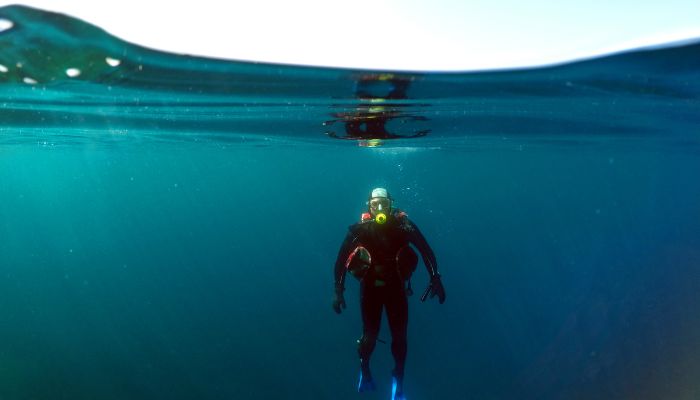
Health Benefits of Apnea
The benefits of freediving are more than amazing. Although it may seem that it is simply a matter of holding your breath, the truth is that there is much more at stake.
The discipline, endurance and concentration required to practice this sport have a significant influence and make our body make a truly fascinating mind-body connection.
But what is its real effect? How can it benefit us so much? We'll tell you about it in detail right now.
What is Apnea?
It is a fascinating discipline that involves the voluntary suspension of breathing.
This act defies the limits of the human body and connects the individual with a state of tranquility and unique concentration.
It consists of holding your breath for specific periods of time, both in and out of the water.
When immersed in this state of controlled respiratory suspension, divers and freedivers experience a series of physiological and mental responses that contribute to their overall well-being.
The most interesting thing is that apnea goes beyond a simple physical exercise.
In this state of suspension, a deep connection is established between the mind and the body.
The intense concentration required to control breathing promotes mental relaxation, relieving stress and improving mental clarity.
Health Benefits of Apnea
Freediving is not only exciting and challenging, but also provides countless health benefits, both physical and mental.
Diving into the waters to do this sport can be a gateway to a comprehensive improvement.
We tell you all its advantages:
Improves Aerobic Capacity
Apnea, by challenging the limits of breathing and lung capacity, becomes an exceptional exercise to improve aerobic capacity.
During practice, the body optimizes oxygen utilization, strengthening the cardiovascular system and improving the efficiency of the respiratory system.
This improvement not only benefits divers, but also has positive applications in general health.
Strengthening Resilience
Physical endurance is essential in many daily activities, and apnea contributes significantly to its development.
Training for prolonged periods of apnea strengthens the respiratory muscles and improves the body's ability to withstand prolonged exertion.
This increase in endurance has positive implications in daily life and in the practice of other sports.
Mental Balance and Stress Reduction
The mind-body connection induced by freediving not only translates into physical benefits, but also into mental balance.
The concentration required to control breathing promotes relaxation and reduces stress levels.
This practice can become an effective tool for those seeking to relieve daily pressure and find a moment of peace.
Improved Body Awareness
Another benefit of freediving is that freediving requires special attention to the body's signals.
By learning to listen and understand these signals, practitioners develop greater body awareness.
This awareness is not only valuable in the water, but also translates into a better understanding of the body's needs and limits in everyday life.
General Welfare Promotion
Together, these benefits converge to promote overall wellness.
Freediving is not only about challenging your physical limits, but also about cultivating a healthy and balanced life.
Practitioners of freediving as a sport see benefits such as improved cardiovascular health, a clearer mind and a more resilient body.
From what age can I practice freediving?
Apnea can be introduced at an early age under proper supervision.
However, it is essential to emphasize that the teaching of freediving to children must be carried out by specialized instructors and in controlled environments.
There are programs designed specifically for young people interested in freediving.
These programs focus on gradually introducing children and adolescents to apnea control and breathing techniques, promoting safe and fun learning.
The participation of parents or guardians is essential during this process.
In fact, adolescence is a propitious period to start practicing freediving more intensively.
As young people develop a greater understanding of their bodies and ability to follow instructions, freediving can become an exciting activity that promotes physical and mental health.
Even in adulthood, apnea can be practiced with additional precautions.
Cardiovascular and respiratory health should be assessed before embarking on intensive practice.
Apnea at a moderate pace can offer significant benefits without compromising safety.
Can Anyone Do Freediving?
As we have already seen, the benefits of freediving are really interesting, but can they be used by anyone?
The truth is that, being highly adaptable, this sport can be practiced by people of different ages and fitness levels.
Its versatility allows practitioners to adapt the intensity and duration of freediving according to their individual capabilities.
But be careful! It's not just jumping into the water.
Before starting, you should know that if you have respiratory, cardiovascular or ear problems, it may be necessary to undergo a medical evaluation.
Safety should always be the priority, and anyone with pre-existing health conditions should seek professional approval before beginning.
Other than that, it is an activity that almost anyone can practice and take advantage of its incredible health benefits.
If you have any questions about this sport or want to know if you are suitable or not, do not hesitate to contact us at our dive center in Lanzarote.


